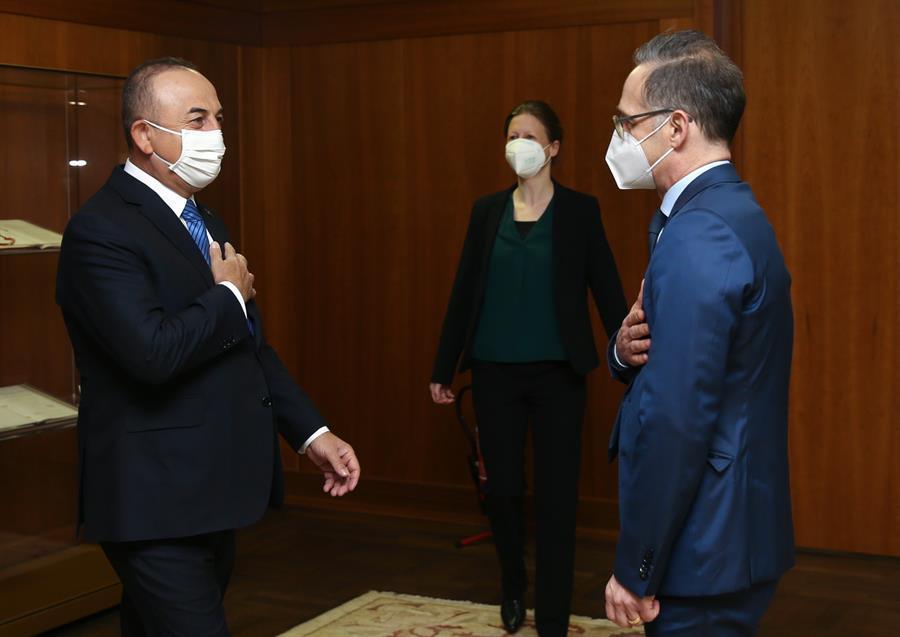
Foreign fighters should leave Libya, but legitimate forces are there to train military under a pact with a legitimate government, Turkish Foreign Minister Mevlüt Çavuşoğlu said on May 6 over calls by Germany for withdrawal of “foreign fighters.”
One should not confuse the troops that have “legitimate presence in Libya with foreign terrorist fighters” in the country, Çavuşoğlu said, speaking at a joint press conference with his German counterpart, Heiko Maas.
He also warned that calling on Ankara to end its support for Libya’s government would in fact undermine this legitimate government.
“There are many foreign fighters in Libya; there are mercenaries. We agree on their withdrawal. However, the end of the support the country needs, such as military training and consultancy support by agreement of two sovereign countries, is not in Libya’s benefit. Intervening in such agreements between the two countries would not be the right approach for third parties,” he said.
Çavuşoğlu was referring to a military cooperation accord under which Turkey sent military advisers and trainers to Tripoli to support the previous Government of National Accord (GNA) against the eastern-based Libyan National Army (LNA).
Touching upon the issue of ties between the European Union and Turkey, the minister said there has been a positive atmosphere with Brussels, and Germany contributed to this, but it was about time to take concrete steps.
Maas, for his part, said that Germany supports the Turkey-EU dialogue. “Last year was a difficult year in the relationship between the EU and Turkey. This year seems to be a much better one,” he stated.
Elaborating on German tourists that would visit Turkey this summer, Çavuşoğlu said the Turkish government wants to continue cooperation with Germany on the issue, noting that Ankara has taken additional measures for the safety of the tourists amid the pandemic.
Turkey will vaccinate the majority of people working in the tourism sector by May who German tourists might come in contact with during their visit to Turkey, Çavuşoğlu said.
Germany wants to allow as much holidaying as it responsibly can this summer, Maas said on Thursday.
“I believe that people need a perspective. We want people to be able to go on holiday as much as possible in a responsible way during the summer,” Maas stated.
Erdoğan, Merkel hold videoconference meeting
President Recep Tayyip Erdoğan and German Chancellor Angela Merkel held a videoconference on May 5 and discussed bilateral and Turkey-EU relations as well as regional issues, the Turkish Communications Directorate said.
Referring to the latest developments in Libya, Erdoğan reaffirmed Turkey’s support for the Government of National Unity and willingness to cooperate with Germany in this regard.
The Turkish president expressed hope that Germany’s general election process will be beneficial and that the relations between the two countries would improve further with a prudent and strategic perspective in the new period.
Stressing that the momentum attained in Turkey-EU relations should not be lost, he said Greece has been continuing with its provocative actions.
Greece is continuing its immoral and illegal practice of pushing back asylum seekers in the Aegean Sea, but Turkey has been maintaining its moderate attitude to preserve the positive agenda, the Turkish president underlined.
Merkel encouraged Turkey to push for the withdrawal of thousands of foreign fighters from Libya in order to bolster the Libyan interim government, her spokesman Steffen Seibert said in a statement.
Merkel and Erdoğan agreed to support the interim government of Prime Minister Abdul Hamid Mohammed Dbeibah in its efforts to improve the supply situation for the population and in preparing elections by year-end, the spokesman said.
“The Chancellor emphasized that an early start of the withdrawal of foreign soldiers and mercenaries would send an important signal,” the spokesman added.
Libya’s interim government came into being in March, replacing two rival administrations - one based in Tripoli and the other in the country’s east.
Turkey had backed the Tripoli-based Government of National Accord against the eastern-based Libyan National Army, which was supported by Russia, Egypt, the United Arab Emirates and France.